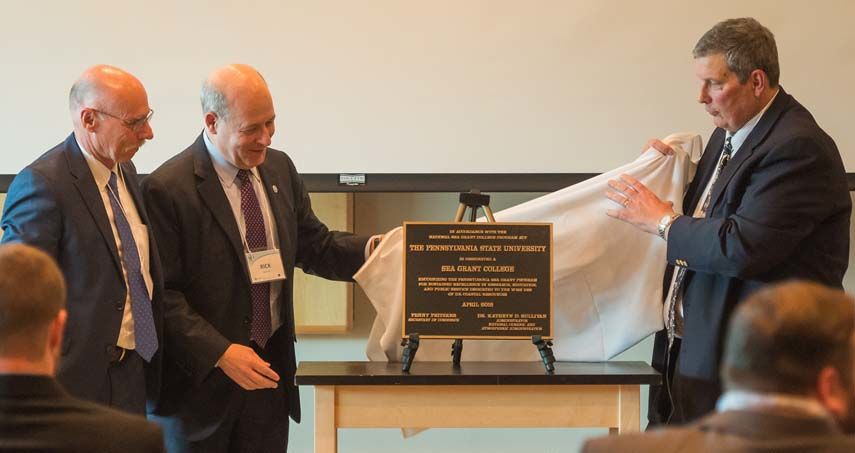
NOAA Awards Sea Grant College Status to Penn State.
The National Oceanic and Atmospheric Administration (NOAA) and the National Sea Grant College Program have awarded Sea Grant College status to Penn State based on the strength of Pennsylvania Sea Grant, a research and outreach program operated by Penn State Erie, The Behrend College. The designation reflects a sustained commitment to managing marine and coastal resources across the Commonwealth, including the Lake Erie, Delaware River and Susquehanna River watersheds.
“The work of Sea Grant is integral to NOAA’s capacity to partner regionally and deliver locally meaningful services,” said Dr. Richard Spinrad, NOAA’s chief scientist, who made the formal presentation during an April 1 program at the Tom Ridge Environmental Center. “The research, outreach and education efforts by Pennsylvania Sea Grant have contributed to sustaining aquatic ecosystems, coastal shorelines, and the jobs and businesses that depend on a healthy environment.”
“This validates our commitment to enhancing Pennsylvania’s coastal areas,” said Bob Light, director of Pennsylvania Sea Grant and senior associate dean for research and outreach at Penn State Behrend. “Our professional staff across the state has collaborated with numerous agencies, organizations and individuals to sustain and add value to the state’s coastal regions, including Lake Erie and Presque Isle State Park."
The National Sea Grant College Program links university-based research and outreach programs in every coastal and Great Lakes state. Sea Grant programs work with more than 3,000 scientists, engineers, educators, students and outreach experts to manage coastal hazards and sustainable coastal development and to promote seafood safety.
Pennsylvania Sea Grant has coordinated nearly $3.4 million in applied research projects, including studies of fish tumors and harmful algal blooms. The program has worked with partner organizations to address issues such as beach closings, bird deaths, climate adaptation, aquatic invasive species and fish consumption advisories; its study of deformities in bullhead catfish was a key factor in the U.S. Environmental Protection Agency’s decision to delist Presque Isle Bay as an “area of concern.”
Sea Grant led the effort to develop a statewide management plan for aquatic invasive species, including Asian carp. That led to more than $6 million in funding for rapid, coordinated responses to invasive species infestations.
The program also has helped to preserve more than 1,600 acres of recreational and open space, including 2.6 miles of Lake Erie shoreline. It led efforts to protect fishing access at four sites along Lake Erie and its tributaries, permanently conserving more than 20 acres of new park land.
Support for educational programs across the state has had even more impact. On boats, or walking the shoreline, collecting data – and sometimes litter – students in grades K-12 better understand how human activities and lifestyles affect the environment, said Marti Martz, a senior coastal outreach specialist for Pennsylvania Sea Grant and a project leader for the Center for Great Lakes Literacy.
“The students who benefit from our programs won’t all go on to careers in science,” Martz said, “but they can all become environmental stewards. That could dramatically improve our environment, our health and our economy.”
Pennsylvania Sea Grant formed in 1998 with funding from the National Sea Grant College Program. The program, a partnership of NOAA, Penn State, and the Commonwealth of Pennsylvania, extended its reach in 2004, advocating for the environmental and economic health of the Delaware River, which includes the world’s busiest freshwater port, and the Susquehanna River, the largest tributary to the Chesapeake Bay.
In 2009, the National Sea Grant College Program designated Pennsylvania Sea Grant an Institutional Program, with a statewide mandate and an expanded research portfolio. The program focused its leadership on three critical areas: healthy coastal ecosystems, resilient communities and economies, and education and workforce development.
To learn more about Pennsylvania Sea Grant and its science-based research, education and outreach, visit the Pennsylvania Sea Grant website.


